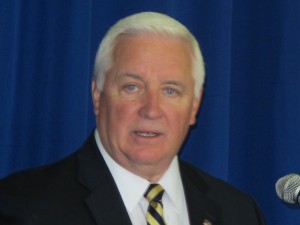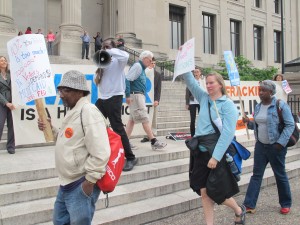Corbett Defends Impact Fee Over Severance Tax
-
Susan Phillips

Susan Phillips / StateImpact Pennsylvania
Governor Tom Corbett speaks at the Keystone Energy Forum in downtown Philadelphia on Friday.
While making a stop in Philadelphia to tout the benefits of natural gas development to the Delaware Valley, Governor Tom Corbett defended his insistence on imposing an “impact fee” rather than a “severance tax.” His remarks made at the industry sponsored Keystone Energy Forum came just a day after the Public Utility Commission announced the distribution from 2012 impact fee payments. Corbett has faced criticism about the impact fee, which some say results in much lower revenues than the more common severance tax imposed by other gas producing states.
“First thing they wanted to do was impose a tax on this new industry just as it was growing in Pennsylvania,” said Corbett. “Well, instead of a tax we enacted an impact fee. I reminded many people the companies were already paying taxes. They pay the corporate net income tax. They pay sales and use tax, their employees pay their income tax. Their taxes are being paid.”
At $50,000 dollars per well, Pennsylvania is the only gas producing state that imposes a fee instead of a tax directly on the amount of gas extracted from wells.
The Energy Forum was held at the Franklin Institute Friday morning in downtown Philadelphia. Outside the museum, several dozen people protested Corbett’s education, welfare and environmental policies, chanting “one-term Corbett.”

Susan Phillips / StateImpact Pennsylvania
Activists marched outside the Franklin Institute protesting education cuts, welfare cuts, and natural gas drilling.
Environmentalists who had reserved a seat at the free event say they were turned away at the door.
With no activists in the audience, Corbett took the opportunity to defend his environmental record.
“And you may hear some people on the outside complaining that I don’t believe in the environment and the public health,” Corbett told the forum’s attendees. “Well, that can’t be further from the truth. We do believe in it. But we believe it can be dealt with in a very safe, logical, scientific, well thought out way, removing emotion from the issue.”
The largest percentage of the $202.4 million dollars in impact fees go directly to counties and municipalities impacted by drilling. The county reaping the highest benefit from the impact fee this year is Bradford, receiving more than $7 million dollars. For the second year in a row, Lawrence Township, Clearfield County is the municipality that will rake in the highest amount, almost $800,000.
Governor Corbett says it’s better to keep the revenue out of the general fund.
“Money goes for local improvements,” said Corbett, “for investments in public safety, and the monies are going straight to the communities that are affected.”
Counties that have no drilling activity also receive some of the funds.
The top drillers contributing to this year’s impact fee payments include Chesapeake Energy, Range Resources and Talisman Energy.
About $25 million dollars gets distributed to state agencies. Governor Corbett says this has helped fund environmental protection.
“At the state level, we’re using the money to also increase funding for conservation districts by 50 percent so far,” he said. “We’ve put new money into our Growing Greener program for the first time in ten years. And we’ve added money to the Department of Environmental Protection for enforcement.”
The funds will be distributed by July 1.
















